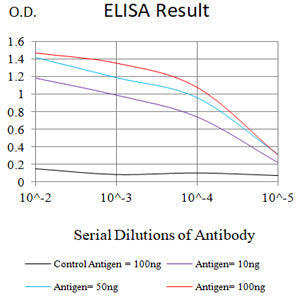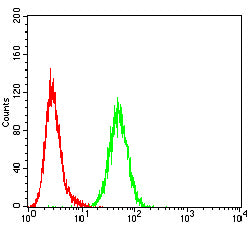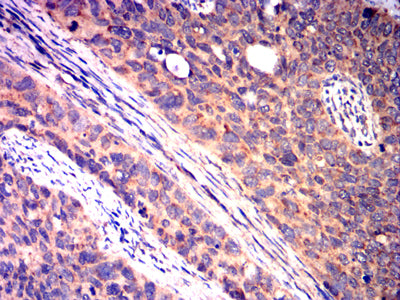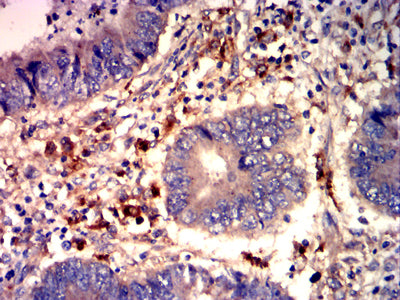




| WB | 1/500 - 1/2000 | Human,Mouse,Rat |
| IF | 咨询技术 | Human,Mouse,Rat |
| IHC | 1/200-1/1000 | Human,Mouse,Rat |
| ICC | 技术咨询 | Human,Mouse,Rat |
| FCM | 1/200-1/400 | Human,Mouse,Rat |
| Elisa | 1/10000 | Human,Mouse,Rat |
| Aliases | p50; Bp50; CDW40; TNFRSF5 |
| Entrez GeneID | 958 |
| clone | 4E4C6 |
| WB Predicted band size | 30.6kDa |
| Host/Isotype | Mouse IgG1 |
| Antibody Type | Primary antibody |
| Storage | Store at 4°C short term. Aliquot and store at -20°C long term. Avoid freeze/thaw cycles. |
| Species Reactivity | Human |
| Immunogen | Purified recombinant fragment of human CD40 (AA: extra(21-193)) expressed in E. Coli. |
| Formulation | Purified antibody in PBS with 0.05% sodium azide |
+ +
以下是关于CD40抗体的代表性文献示例(内容为示例性概括,具体文献需根据实际研究补充):
---
1. **文献名称**:*Agonistic CD40 Antibodies in Cancer Immunotherapy*
**作者**:Vonderheide, R.H.
**摘要**:探讨激动型CD40抗体通过激活抗原呈递细胞(如树突状细胞)增强抗肿瘤免疫反应的机制,并在黑色素瘤和胰腺癌的临床试验中显示初步疗效。
2. **文献名称**:*CD40 Agonism Enhances T-cell Priming in Pancreatic Cancer*
**作者**:Winograd, R. et al.
**摘要**:研究CD40激动剂联合化疗对胰腺癌模型的作用,证明其通过重塑肿瘤微环境促进T细胞浸润并协同增强抗肿瘤效果。
3. **文献名称**:*Targeting CD40 to Overcome PD-1 Checkpoint Resistance*
**作者**:Bajor, D.L. et al.
**摘要**:揭示CD40抗体与抗PD-1疗法联用可逆转T细胞耗竭,在实体瘤模型中显著提高疗效,提出协同免疫激活的潜在策略。
4. **文献名称**:*CD40 Antibody in Autoimmunity: Balancing Immune Activation*
**作者**:Klarquist, J. et al.
**摘要**:分析CD40拮抗型抗体在自身免疫病中的应用,通过阻断CD40-CD40L通路抑制过度免疫反应,为类风湿性关节炎等疾病提供治疗思路。
---
**备注**:以上文献信息为示例,实际引用需根据具体研究内容调整并核实原文。建议通过PubMed或Google Scholar以关键词“CD40 antibody”、“agonist/antagonist CD40”、“cancer immunotherapy”检索最新文献。
CD40. a member of the tumor necrosis factor receptor (TNFR) superfamily, is a co-stimulatory protein expressed on antigen-presenting cells (APCs), B cells, and some non-immune cells. Its interaction with CD40 ligand (CD40L/CD154) on T cells is critical for adaptive immune activation, including antibody class switching, germinal center formation, and T-cell priming. CD40-targeting antibodies are broadly categorized into **agonists** (activating CD40 signaling) and **antagonists** (blocking CD40-CD40L interaction), each with distinct therapeutic applications.
Agonistic CD40 antibodies (e.g., APX005M, SEA-CD40) aim to enhance anti-tumor immunity by activating APCs, promoting dendritic cell maturation, and boosting T-cell responses. They are being tested in cancers like melanoma and pancreatic adenocarcinoma, often combined with checkpoint inhibitors or chemotherapy. Conversely, antagonistic CD40 antibodies (e.g., iscalimab) suppress overactive immune responses in autoimmune diseases (e.g., rheumatoid arthritis, transplant rejection) by disrupting CD40-CD40L signaling.
Challenges include managing systemic toxicity (e.g., cytokine release syndrome with agonists) and optimizing tissue-specific targeting. Antibody isotype (IgG1 vs. IgG2) also influences efficacy: IgG1 promotes stronger immune activation via Fcγ receptor engagement, while IgG2 may reduce off-target effects. Recent studies explore bispecific formats or tumor-localized delivery to improve safety.
Overall, CD40 antibodies represent a versatile immunomodulatory tool, with ongoing clinical trials refining their role in oncology and autoimmunity. Balancing potency and tolerability remains key to unlocking their full therapeutic potential.
×